Improving the Quality of Recyclate Films by Additivation

Film processing with a cast film extrusionline.
(c) Ursula Raapke / Fraunhofer LBF
The quality of recyclate materials of plastics significantly affects their application. With the exception of slightly damaged production waste, recycled plastics cannot be used in their original form. Usually, they are sorted, cleaned, and reprocessed to form usable granules.
However, the recycled material’s stability and processing ability for its intended application often require post-stabilization with suitable additives. Fraunhofer Institute of Structural Durabiity and System Reliability LBF has developed new formulations for enhance the quality of new recyclate films. At Plastics World Expo Europe, Essen, June 14-15, 2023, Booth C834, the researchers will give more information.
Plastic films, such as bags and wraps, are one of the most common types of plastic waste generated by households, supermarkets, and other commercial and industrial sectors. According to the European Plastics Converters Association (EuPC), around 25 percent of all plastic packaging waste in Europe comes from plastic films. However, these materials can be recycled and transformed into new products such as furniture, bags, and even building materials, which contributes to a circular economy. The recycling process involves collecting, sorting, and cleaning plastic films, which are then melted down and reshaped into pellets for manufacturing. In Europe, there are several companies dedicated to recycling plastic films, although they are not named here. These companies also play a vital role in reducing plastic waste and promoting sustainability. With growing efforts to decrease plastic waste in Europe, the recycling of plastic films is becoming increasingly crucial.
Benefits by additive restabilization
The use of additives such as stabilizers, compatibilizers, and reactive agents can significantly improve the quality of recyclates, making them comparable to virgin materials. For instance, polyethylene (PE) films made from recycled plastic require no defects during their manufacture to ensure their reliability and durability. Researchers at the Fraunhofer Institute for Structural Durability and System Reliability LBF in Darmstadt have successfully enhanced the quality of these films through the addition of a suitable additive formulation.
Formulation development for recycling materials
The development of a formulation of multiple additives is a key approach for enhancing the properties of plastics, including those made from recycled materials. This involves combining several different additives, each with a specific function, to create a customized solution that meets the specific needs of the application. For example, a formulation of additives may include a processing aid to improve the melt flow of the plastic, a UV stabilizer to protect the plastic from UV degradation, and an antioxidant to improve the plastic’s durability. By combining these additives in the right proportions, manufacturers can create a plastic with enhanced properties that is suitable for a wide range of applications. Developing such a formulation is a complex process that requires careful consideration of the properties of the plastic, the performance requirements of the application, and the potential environmental and health impacts of the additives used. As such, research and development efforts in this area are focused on finding sustainable and environmentally friendly solutions that can be used in the production of plastics.
By adding the appropriate formulation, which is a composition of different additives, the researchers at the Fraunhofer LBF achieved significant improvements in the quality of the recycled PE films. The resulting films are reliable, durable, and can be efficiently manufactured at a lower cost. This achievement provides a significant boost to the use of recycled plastics, making it an attractive alternative to virgin materials.
Improvement in sustainability
The successful utilization of innovative and specialized additives to enhance the quality of recycled plastics is a significant step towards sustainable and environmentally friendly production processes. It enables industries to reduce their carbon footprint by applying recycled materials instead of virgin ones. Therefore, the use of additives to improve recyclate properties should be encouraged and promoted. Looking further down the line, the variables of the compounding (exact composition, process parameters) raise the complexity once more, because they influence the efficiency of the recycling additives. As a result, it becomes only clear in the very late stages of the development cycle if and how all targeted properties (aging resistance, mechanics) can be achieved and if these are continuously under control considering further variables (batch-to-batch variation, incoming streams). Despite trial and error being still widely used in this process, the best path for a successful additivation is an analytical characterization of the available recycling material. The result of such targeted screening delivers the then needed information for a tailor-made additivation.
Wissenschaftliche Ansprechpartner:
Dr. Elke Metzsch-Zilligen, elke.metzsch-zilligen@lbf.fraunhofer.de
Dr. Michael Großauser, michael.grosshauser@lbf.fraunhofer.de
Weitere Informationen:
https://www.lbf.fraunhofer.de/en/projects/plastic-additives.html
Media Contact
All latest news from the category: Materials Sciences
Materials management deals with the research, development, manufacturing and processing of raw and industrial materials. Key aspects here are biological and medical issues, which play an increasingly important role in this field.
innovations-report offers in-depth articles related to the development and application of materials and the structure and properties of new materials.
Newest articles

Innovative 3D printed scaffolds offer new hope for bone healing
Researchers at the Institute for Bioengineering of Catalonia have developed novel 3D printed PLA-CaP scaffolds that promote blood vessel formation, ensuring better healing and regeneration of bone tissue. Bone is…

The surprising role of gut infection in Alzheimer’s disease
ASU- and Banner Alzheimer’s Institute-led study implicates link between a common virus and the disease, which travels from the gut to the brain and may be a target for antiviral…

Molecular gardening: New enzymes discovered for protein modification pruning
How deubiquitinases USP53 and USP54 cleave long polyubiquitin chains and how the former is linked to liver disease in children. Deubiquitinases (DUBs) are enzymes used by cells to trim protein…



